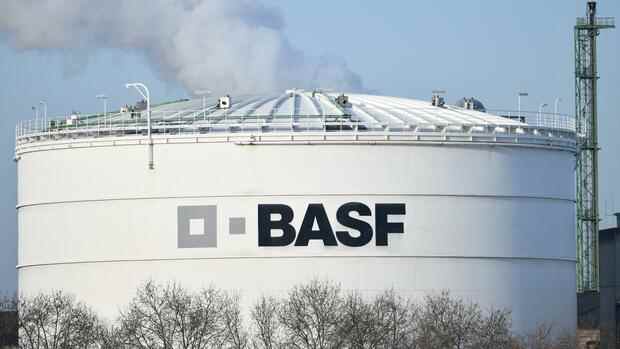The chemical company’s profit fell by almost 29 percent in the first quarter.
(Photo: dpa)
Frankfurt A billion-dollar write-down on the majority stake in Wintershall Dea brought the chemical group BASF a significant drop in net profit in the first quarter. Despite a very positive operational development, earnings after taxes fell by 29 percent to 1.22 billion euros, as the company announced on Monday.
Overall, according to BASF, earnings were impacted by EUR 1.1 billion due to impairments at Wintershall Dea. They arise primarily in connection with Wintershall’s loan to the project company for the halted Nord Stream 2 Baltic Sea gas pipeline.
The chemicals company accounts for its 67 percent stake in Wintershall Dea at the proportionate equity value, so that corresponding changes affect BASF’s investment result. Most recently, the stake in Wintershall Dea was still 9.6 billion euros on BASF’s books.
Meanwhile, operationally, the chemical giant was doing much better than expected. Operating profit (EBIT) before special items increased by 21 percent to 2.8 billion euros and was therefore also significantly higher than previously expected by analysts. They had expected an average of around 2.43 billion euros in EBIT.
Top jobs of the day
Find the best jobs now and
be notified by email.
According to the group, sales of 23 billion euros were almost a fifth higher than the previous year’s level and thus slightly above market expectations. According to BASF, the main reasons for the positive operational development were higher prices and slightly positive currency effects.
After the figures were announced, the BASF share rose only briefly and was only slightly above the previous day’s level in the late afternoon. Since the beginning of the year, it has lost more than 15 percent in value, making it one of the weakest values in the Dax and also in the chemical sector.
Analysts see BASF under pressure due to the high energy requirements
The chemical company did not comment on its forecast for the full year on Monday afternoon. So far, he has forecast adjusted operating profit of 6.6 to 7.2 billion euros for 2022, which could amount to a decline of up to 20 percent compared to the previous year’s figure of 7.8 billion euros.
Analysts and investors see the chemical group potentially under strong pressure from the Ukraine war and the resulting sharp rise in gas prices, partly because of its high demand for natural gas. A delivery stop for Russian gas could also hit the chemical giant hard. Because the main plant in Ludwigshafen in particular is relatively heavily dependent on the supply of Russian natural gas.
In addition, the Ukraine crisis may push the planned divestment of Wintershall’s stake into the distant future. The minority partner at Wintershall Dea is the investment company Letter One, controlled by the Russian oligarch Mikhail Fridman.
Wintershall Dea is also relatively heavily involved in Russian gas production itself. Last year, Wintershall Dea’s activities in Russia accounted for around a fifth of operating income (Ebitda) and 63 percent of oil and gas reserves.
More: The consequences of an energy boycott for German industry – and for Russia
